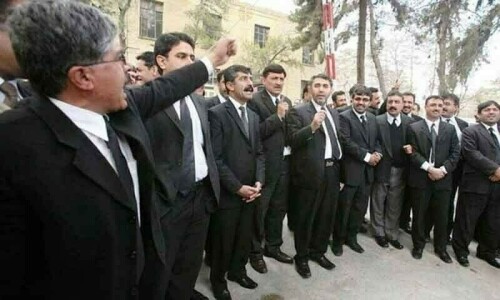
KARACHI: The Pakistani government had complained to the US about being unaware of American funding provided directly to the Pakistan military, reveal previously unpublished American diplomatic cables. The reports also disclose tensions between the civilian government and the army over the use funds provided for counterinsurgency operations.
In a November 2009 meeting with former US Ambassador Anne Patterson, then Finance Minister Shaukat Tarin “appealed to the ambassador to keep him informed of funds the US directs to the Pakistani military.
“Promising that he would not reduce the military’s budget based on US assistance flows, Tarin said that the finance ministry needs to be kept aware for overall budgeting purposes. Army Chief of Staff General Kayani does not pass on this information.”
In an earlier meeting in September, “the Ambassador said the USG had purchased $370m in equipment for the military through FY09 Pakistan Counterinsurgency Capability Fund (PCCF) supplemental funds. Tarin said he was unaware of this.”
At the time the finance minister added that he “would work to see that the purchases of these items were removed from the army’s capital budget.”
In the November 2009 meeting Tarin also provided numbers to prove that the vast majority of Coalition Support Funds (CSF) given to Gen Pervez Musharraf’s government — money provided as reimbursements for expenses incurred to support America’s efforts against Al Qaeda and the Taliban — had not been used for counterinsurgency purposes, or even for the military.
According to Tarin, the finance ministry “had done a detailed analysis and concluded that, of the total of $6.6bn the US had provided to Pakistan under the Coalition Support Fund, only some $250m had actually gone to the Pakistani army under (then) President Musharraf; the rest had gone into the regular budget, protestations by the then-government to the contrary notwithstanding.”
While previously published cables have revealed US concerns about possibly inflated CSF claims by the army, a new cable reveals that America also feared the civilian government that succeeded Gen Musharraf would continue to use the CSF for budgetary support.
“The temptation for the new coalition government to tap CSF for non-military purposes will be high; if we are going to consider ways to improve the implementing mechanisms of CSF, the time to act is now,” noted a cable from March 2008.
“The new coalition government will be seeking new sources of revenue to pay for social programs promised in the campaign; the large military budget and the CSF payments will be a tempting target to mine.”
The civilian government, in turn, expressed mistrust about the army’s use of CSF funds. “The Pakistan People’s Party (PPP) finance expert, Syed Naveed Qamar … expressed skepticism of the military’s CSF claims and asked the US to increase oversight and ensure that ‘claims were not over-inflated or siphoned off into private coffers.’
“The presumptive Pakistan Muslim League-N (PML-N) finance minister also expressed his conviction that the military budget should be more transparent and subject to parliamentary scrutiny.”
These statements only buttress American claims that the army has inflated CSF claims; one previously published cable, for example, has mentioned a $26m claim for barbed wire and a $70m claim for radar maintenance against an enemy that does not pose an air threat.
On the other hand, in another previously published cable Gen Kayani had claimed to then CENTCOM commander Gen David Petraeus in January 2009 that “only 40 per cent of the money had been returned to military coffers in the past. Kayani said the money had mostly supported the federal government’s budget.”
The comment ending the March 2008 took note of this mistrust on both sides. “If CSF is going to be reformed it must be done soon. Delaying much longer threatens to create tension between a civilian government we are eager to support and a military that plays a vital role in the fight against extremism. It is time to manage expectations on both sides.”
Cables referenced: WikiLeaks # 134295, 146991, 188670, 223755, 233602. All cables are available on Dawn.com.















































